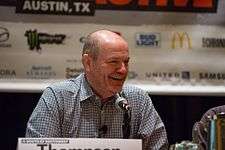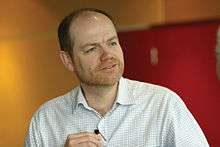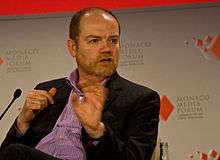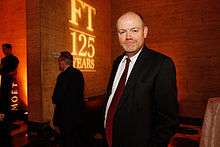Mark Thompson (media executive)
Mark John Thompson[1] (born 31 July 1957)[2] is a British media executive who is the current president and chief executive officer of The New York Times Company. From 2004 to 2012, he served as Director-General of the BBC, and before that was the Chief Executive of Channel 4. In 2009 Thompson was ranked as the 65th most powerful person in the world by Forbes magazine.[3]
Mark Thompson | |
|---|---|
 Mark Thompson at SXSW in 2016 | |
| 14th Director-General of the BBC | |
| In office 22 June 2004 – 17 September 2012 | |
| Deputy | Mark Byford |
| Preceded by | Mark Byford (acting) |
| Succeeded by | George Entwistle |
| Personal details | |
| Born | Mark John Thompson 31 July 1957 London, England |
| Nationality | British |
| Spouse(s) | Jane Blumberg ( m. 1987) |
| Children | 3 |
| Education | Stonyhurst College |
| Alma mater | Merton College, Oxford |
Early life
Thompson was born in London, England, and brought up in Welwyn Garden City, Hertfordshire,[4] by his mother, Sydney Corduff, his sister, Katherine, and father, Duncan John Thompson. Sydney was Irish, the daughter of a County Donegal policeman.[5] Duncan was an accountant from Preston who died when Thompson was twelve after suffering from chronic illness and depression.[4] Thompson was educated by Jesuits at the independent school Stonyhurst College in Lancashire, and then went to Merton College, Oxford where he took a first in English.[2] He edited the university magazine, Isis.[6]
Early career: 1979–2002
Thompson first joined the BBC as a production trainee in 1979. His subsequent career at the corporation included a number of roles.
In 1981 he assisted in the launch of the long-running consumer programme Watchdog. Two years later he was part of the team that created British television's first national breakfast television programme, Breakfast Time.
In 1985 Thompson became the Output Editor of Newsnight and in 1988, at the age of 30, he was promoted to Editor of the Nine O'Clock News.
In 1990 he became Editor of Panorama. He was made Head of Features in 1992 and Head of Factual Programmes in 1994.
In 1996 Thompson succeeded Michael Jackson as Controller of BBC2. He commissioned series including The Cops, The Royle Family, Our Mutual Friend and The Fast Show. He left BBC Two in 1999 and was replaced by Jane Root, who became the channel's first female Controller.
In 1999 Thompson was named Director, National and Regional Broadcasting at the BBC. He became the BBC Director of Television in 2000, but left the corporation in March 2002 to become Chief Executive of Channel 4.
Chief Executive of Channel 4: 2002–2004
Thompson was Channel 4's Chief Executive from 2002 to 2004. He succeeded Michael Jackson in the role.
Director-General of the BBC: 2004–2012
Appointment as Director-General

Thompson was appointed Director-General of the BBC on 21 May 2004.[7] He succeeded Greg Dyke, who resigned on 29 January 2004 in the aftermath of the Hutton Inquiry. Although he had originally stated he was not interested in the role of Director-General and would turn down any approach from the BBC, he changed his mind, saying the job was a "one-of-a-kind opportunity". The decision to appoint Thompson Director-General was made unanimously by the BBC Board of Governors, headed by the then new Chairman Michael Grade (another former chief executive of Channel 4). His appointment was widely praised: Culture Secretary Tessa Jowell, Shadow Culture Secretary Julie Kirkbride and Greg Dyke were amongst those who supported his selection. He took up the role of Director-General on 22 June 2004[7] (Mark Byford had been Acting Director-General since Dyke's resignation). On his first day he announced several management changes, including the replacement of the BBC's sixteen-person executive committee with a slimmed-down executive board of nine top managers.
Editorial guideline breaches
In 2007 it emerged that the BBC had been involved in a number of editorial guideline breaches. Thompson, as BBC editor-in-chief, investigated the breaches, and presented his interim report to the BBC Trust on 18 July 2007.[8] The Trust felt that the BBC's values of accuracy and honesty had been compromised, and Thompson outlined to the Trust the actions he would take to restore confidence.
Later that day he told BBC staff, via an internal televised message,[9] that deception of the public was never acceptable. He said that he, himself, had never deceived the public – it would never have occurred to him to do so, and that he was sure that the same applied to the "overwhelming majority" of BBC staff. He also spoke on BBC News 24[10] and was interviewed by Gavin Esler for Newsnight. He stated that "from now on, if it [deceiving the public] happens we will show people the door."[11] Staff were emailed on 19 July 2007[12] and later in the year all staff, including the Director-General, undertook a Safeguarding Trust course.[13]
Programme production criticism
In late 2007, Thompson's directorship at the BBC was criticised. Sir Richard Eyre, former artistic director of the National Theatre, accused the BBC under Thompson's leadership of failing to produce programmes "that inspired viewers to visit galleries, museums or theatres".[14] He was also criticised by Tony Palmer, a multi-award-winning filmmaker. Of the BBC, Palmer stated that it "has a worldwide reputation which it has abrogated and that's shameful. In the end, the buck stops with Mark Thompson. He is a catastrophe."[15]
The Russell Brand Show prank telephone calls row

In October 2008, Thompson had to cut short a family holiday to return to Britain to deal with the arrival of The Russell Brand Show prank telephone calls row. Thompson took the executive decision to suspend the BBC's highest paid presenter, Jonathan Ross, from all his BBC work for three months without pay. He also said it was the controversial star's last warning.[16] Nevertheless, Thompson reiterated the BBC's commitment to Ross' style of "edgy comedy", claiming that "BBC audiences accept that, in comedy, performers attempt to push the line of taste".[17] Thompson had previously defended the star's conduct and salary in 2006, when he described Ross as "outstanding" and claimed that "the very best people" deserved appropriately high salaries.[18]
In September 2010 Thompson acknowledged some of the BBC's previous political bias he had witnessed early in his career. He stated: "In the BBC I joined 30 years ago there was, in much of current affairs, in terms of people's personal politics, which were quite vocal, a massive bias to the left". He added: "the organisation did struggle then with impartiality".[19]
Jerry Springer: The Opera blasphemy allegations
He was criticised by religious groups in relation to the broadcast of Jerry Springer: The Opera, with a private prosecution brought against the BBC for blasphemy. Lord Pannick QC appeared and won the case. The High Court ruled that the cult musical was not blasphemous, and Pannick stated that Judge Tubbs had "acted within her powers and made the only decision she could lawfully have made; while religious beliefs were integral to British society, so is freedom of expression, especially to matters of social and moral importance."[20]
Accusations of pro-Israeli editorial stance
A number of commentators have suggested that Thompson has a pro-Israeli editorial stance, particularly since he supported the controversial decision by the BBC not to broadcast the DEC Gaza appeal in January 2009.[21] Complaints to the BBC about the decision, numbering nearly 16,000, were directed to a statement by Thompson.[22] In May 2011, Thompson ordered the lyrics 'free Palestine' in a rap on BBC Radio 1Xtra to be censored.[23] During a meeting of the British Parliament's Culture and Media Committee in June 2012, Thompson also issued an apology for not devoting more coverage to the murders of an Israeli settler family in the West Bank, saying the "network got it wrong" – despite the fact that the incident occurred on the same day as the 2011 Tōhoku earthquake and tsunami.[24]
Tam Dean Burn wrote in The Herald: "I would argue that this bias has moved on apace since Thompson went to Israel in 2005 and signed a deal with prime minister Ariel Sharon on the BBC's coverage of the conflict."[25]
Nick Griffin Question Time appearance
In October 2009, Thompson defended the decision by the BBC to invite British National Party leader Nick Griffin to appear on the Question Time programme following criticism by Labour politicians including Home Secretary Alan Johnson and Secretary of State for Wales Peter Hain. The decision also led to protests outside BBC Television Centre by UAF campaigners. Thompson said: "It is a straightforward matter of fact that... the BNP has demonstrated a level of support which would normally lead to an occasional invitation to join the panel on Question Time. It is for that reason alone... that the invitation has been extended. The case against inviting the BNP to appear on Question Time is a case for censorship... Democratic societies sometimes do decide that some parties and organisations are beyond the pale. As a result, they proscribe them and/or ban them from the airwaves. My point is simply that the drastic steps of proscription and censorship can only be taken by government and parliament... It is unreasonable and inconsistent to take the position that a party like the BNP is acceptable enough for the public to vote for, but not acceptable enough to appear on democratic platforms like Question Time. If there is a case for censorship, it should be debated and decided in parliament. Political censorship cannot be outsourced to the BBC or anyone else."[26]
Earning controversy
In 2010, Thompson was identified as the highest paid employee of any public sector organisation in the UK, earning between £800,000 and £900,000 per year.[27] In January 2010, Thompson was criticised over his apparent £834,000 salary by BBC presenter Stephen Sackur, who told him "there are huge numbers of people in the organisation who think your salary is plain wrong and corrosive."[28]
Formula One broadcast rights
Thompson was Director General of the BBC when on 29 July 2011 it was announced that the corporation would no longer televise all Formula One Grand Prix live, instead agreeing to split the broadcast between the BBC and Sky Sports. This prompted an outcry from several thousand fans and a motion on the UK Government e-petition site. On 2 September 2011, Thompson and several "senior BBC figures" were called upon by the House of Commons to answer questions over the exact nature of the broadcast arrangement.[29]
Jimmy Savile sexual abuse scandal
Though Thompson departed the BBC before public exposure of the Jimmy Savile sexual abuse scandal and is not noted in the BBC chronology of the unfolding coverage,[30] Thompson faced questions about his role in the events around Savile's actions and BBC coverage of them. Per a New York Times review, Thompson denied knowing of a BBC Newsnight program on accusations against Savile before the program was dropped soon after Savile's death in October 2011.[31]
Legacy at the BBC
Thompson left the BBC in September 2012 after thirty years working at the corporation. The Independent said the BBC was in "apparent great shape" with his departure and the BBC Trust's chairman, Chris Patten, described his directorship as "outstanding".[32] Fertility expert and presenter Robert Winston criticised Thompson's leadership.[33]
President and CEO of The New York Times Company: 2012–present

On 14 August 2012, Thompson was named CEO of The New York Times Company, effective 12 November 2012.[34] He was brought on to accelerate the company's digital transition and extend its global reach,[35] and in this role he directs strategy and oversees business operations. Thompson invested heavily in the Times' digital products,[36][37] and has attributed increased autonomy for the digital product teams as "the single biggest reason" for the news outlet's success.[38]
In 2013, he hired Meredith Kopit Levien as chief revenue officer and promoted her to chief operating officer in 2017.[39][40][41] Thompson has been critical of Google and Facebook.[42] He has said the Times seeks to be a destination and not reliant on the platforms, and hopes to "more reliably turn engagement into a regular revenue stream".[43] In 2018, he gave a speech at the Open Markets Institute in Washington, D.C., in which he described Facebook's policy of labeling political news as ads as "a threat to democracy".[42] According to a filing with the Securities and Exchange Commission, Thompson's total compensation in 2019 was $6.1 million, including salary and stock awards.[44]
In 2015, he pledged to transform the Times into an "international institution", the same way "we once successfully turned a metro paper into a national one".[45] The Times now has more international digital subscribers than it had total digital subscribers when Thompson took over as CEO.[46] Under Thompson's leadership, The New York Times became the first news organization in the world to pass the one million digital-only subscription mark. As of May 2020, the company surpassed 5 million digital-only subscriptions, and 6 million total subscriptions, accounting for nearly sixty percent of the company's revenue.[47] In 2015, Thompson set the goal of doubling the company's digital revenue by 2020. The goal was met ahead of schedule in 2019. The company's new goal is to have 10 million subscriptions by 2025.[46][48] He has also predicted that the print paper will last for at least 15 more years.[49]
Enough Said
In 2016, Thompson published Enough Said: What's Gone Wrong with the Language of Politics? in which he condemns political discourse that is "just a fight to the political death, a fight in which every linguistic weapon is fair game" and is critical of the rejection of science and expertise, writing that this has disastrous policymaking consequences.[50] Thompson also criticised false balance in news reporting.[50] The book was favorably reviewed by Andrew Rawnsley, who called it an "important study" that "identifies many culprits for the destructiveness of political debate."[50] John Lloyd, writing in the Financial Times, praised the work as reflective and an "intricately but also urgently argued book."[51] The Washington Post said the book shows that Thompson "believes devoutly in the importance ... of intelligent and productive public discussion".[52]
Personal life
Thompson is a Roman Catholic, and was educated at the English Jesuit public school, Stonyhurst College, from 1970-1975. He attends the Oratory Church of St Aloysius Gonzaga. In 2010, The Tablet named him as one of Britain's most influential Roman Catholics.[53] Thompson lives in Oxford with his wife Jane Blumberg (daughter of Baruch Samuel Blumberg) whom he married in 1987. They have two sons and one daughter.[6]
He is a member of the Reform Club[2] and a patron of the Art Room charity in Oxford.[54] In 2002 he joined the board of trustees of Media Trust,[55] the UK's leading communications charity.
In 2011, Thompson was awarded an Honorary Doctorate by Edge Hill University.[56]
In 2012, Thompson served as the first Humanitas Visiting Professor in Rhetoric and the Art of Public Persuasion at the University of Oxford.[57]
See also
References
Specific citations:
- "Mark Thompson, Esq Authorised Biography – Debrett's People of Today, Mark Thompson, Esq Profile". Debretts.co.uk. 31 July 1957. Retrieved 10 May 2012.
- "THOMPSON, Mark John Thompson," in Who's Who 2009 (London: A & C Black, 2008); online ed., (Oxford: OUP, 2008), . Retrieved 25 January 2009.
- "The World's Most Powerful People". Forbes. 11 November 2009. Retrieved 12 November 2009.
- Arlidge, John (16 December 2001). "The Observer Profile". The Guardian. London. Retrieved 12 May 2010.
- "The Daily Podcast Episode featuring Mark Thompson". The New York TImes. 1 May 2020. Retrieved 1 May 2020.
- "NS Profile – Mark Thompson". New Statesman. 3 May 2004. Retrieved 27 January 2009.
- "BBC Press Office: Biographies – Mark Thompson". Retrieved 12 October 2007.
- "Minutes of Trust meeting 18 July 2007" (PDF). Retrieved 10 May 2012.
- "Key points: Thompson speech to staff on editorial breaches". BBC News. 18 July 2007. Retrieved 10 May 2012.
- "News 24 interview on editorial guideline breaches (video)". BBC News. 18 July 2007. Retrieved 10 May 2012.
- "Transcript of Newsnight interview on editorial breaches and staff honesty". Newsarchive.awardspace.com. 18 July 2007. Retrieved 10 May 2012.
- "Email from Mark Thompson to BBC staff on integrity". BBC. 19 July 2007. Retrieved 10 May 2012.
- BBC to teach its stars honesty The Daily Telegraph. Retrieved 8 March 2008
- Asthana, Anushka. "The Guardian: Arts chief warns of cultural 'apartheid'". London. Retrieved 12 September 2007.
- Smith, David. "The Guardian: Director blasts 'BBC ignorance'". London. Retrieved 12 September 2007.
- "Ross suspended for three months". BBC News. 30 October 2008. Retrieved 10 May 2012.
- Russell Brand programme, BBC Radio 2, 18 October 2008 Archived 4 January 2009 at the Wayback Machine
- "BBC defends Ross pay and conduct". BBC News. 7 July 2006. Retrieved 10 May 2012.
- Singh, Anita (2 September 2010). "BBC was biased against Thatcher, admits Mark Thompson". The Daily Telegraph. London.
- Paris, Natalie (5 December 2007). "Jerry Springer play ruled not blasphemous". The Daily Telegraph. London. Retrieved 15 August 2012.
- "Mark Thompson's Blog". BBC.
- "BBC and the Gaza appeal". BBC.
- "BBC under fire for 'censoring' Palestine lyric". The Guardian.
- "BBC apologises for minimal coverage of Fogel murders". Haaretz.
- "To my mind and, it appears, to millions of others, the BBC is increasingly biased towards Israel in this conflict, Heraldscotland staff". The Herald. Glasgow. 1 February 2009. Retrieved 10 May 2012.
- Booth, Robert (22 October 2009). "BBC is right to allow BNP on Question Time, says Mark Thompson". The Guardian. London. Retrieved 12 May 2010.
- Public Sector pay: The numbers BBC News, 20 September 2010
- Wardrop, Murray (15 January 2010). "'Your salary is wrong and corrosive', Mark Thompson , BBC director general, told". The Telegraph. London. Retrieved 19 July 2010.
- "BBC to face questioning from MPs over switch to shared F1 coverage". Autosport. 2 September 2011.
- "Jimmy Savile abuse allegations: Timeline", BBC, 15 October 2012. Retrieved 30 October 2012.
- Nocera, Joe, "The Right Man for the Job?", The New York Times, 29 October 2012. Retrieved 30 October 2012.
- "Is New York Times boss Mark Thompson the luckiest CEO in the world?". The Independent. 5 August 2013. Retrieved 26 August 2019.
- Collins, Nick (30 October 2012). "Robert Winston: BBC is dumbing down science". The Daily Telegraph. London. Retrieved 31 October 2012.
- "Mark Thompson named CEO of New York Times Co". Boston Globe. Retrieved 14 August 2012.
- Ross, Casey (14 August 2012). "Mark Thompson named CEO of New York Times Co". Boston.com. Retrieved 16 July 2020.
- Donnelly, Grace (27 September 2018). "The Digital Rebirth of the New York Times". Fortune. Retrieved 15 July 2020.
- Bell, Emily (9 February 2020). "The New York Times's success lays bare the media's disastrous state". The Guardian. Retrieved 16 July 2020.
- Scire, Sarah (6 February 2020). "Readers reign supreme, and other takeaways from The New York Times end-of-year earnings report". Retrieved 16 July 2020.
- Bercovici, Jeff (15 July 2013). "Forbes Exec Meredith Levien Tapped For Top Advertising Job At New York Times". Forbes. Retrieved 16 July 2020.
- Doctor, Ken (20 April 2015). "What are they thinking? Mark Thompson's approach at the Times". Politico. Retrieved 16 July 2020.
- Alpert, Lukas I. (7 June 2017). "New York Times Promotes Meredith Kopit Levien to Chief Operating Officer". The Wall Street Journal. Retrieved 16 July 2020.
- Bell, Emily (24 June 2018). "Facebook creates Orwellian headache as news is labelled politics". The Guardian. Retrieved 16 July 2020.
- Moses, Lucia (14 December 2017). "New York Times CEO Mark Thompson: Facebook's role needs to be clearer". Digiday. Retrieved 16 July 2020.
- "The New York Times Company: Notice of 2020 Annual Meeting and Proxy Statement" (PDF). The New York Times Company. 22 April 2020. p. 48. Retrieved 11 July 2020.
- Wemple, Erik (14 April 2016). "How will the New York Times appeal to overseas readers?". The Washington Post. Retrieved 16 July 2020.
- "The New York Times Now Gets More Revenue From Subscribers Than Advertisers". Business Insider. 3 February 2018. Retrieved 15 July 2020.
- Pompeo, Joe (29 May 2020). ""Higher Churn and a Smaller Audience": The Pandemic Has Exposed the Haves and Have-Nots of Journalism". Vanity Fair. Retrieved 11 July 2020.
- Benton, Joshua (6 February 2019). "The New York Times is getting close to becoming a majority-digital company". Neiman Lab. Retrieved 15 July 2020.
- Mahanta, Vinod; Laghate, Gaurav (21 November 2019). "We don't see ourselves coming into this market to compete with Indian media: NYT's Mark Thompson". The Economic Times. Retrieved 16 July 2020.
- Andrew Rawnsley, Enough Said: What's Gone Wrong With the Language of Politics? by Mark Thompson – review, The Guardian (4 September 2016).
- John Lloyd, What happened to the language of politics? Rational political speech is under attack and failing to convince a sceptical public. Should we blame the media?, Financial Times (26 August 2016).
- Shesol, Jeff (23 September 2016). "How offending people and lying on the political stage became a mark of integrity". The Washington Post. Retrieved 16 July 2020.
- "The Tablet's Top 100". Archived from the original on 13 March 2016.
- "The Art Room". The Art Room. Archived from the original on 4 March 2012. Retrieved 10 May 2012.
- "Media Trust website".
- http://www.edgehill.ac.uk/news/2011/07/bbc-s-mark-thompson-receives-honorary-award/
- Plunkett, John (5 November 2012). "Mark Thompson (Media),Oxford University,Media,BBC,Jimmy Savile (Media),UK news,New York Times (Media)". The Guardian. London.
Other references:
- Channel 4 boss lands BBC top job (BBC)
- New BBC boss announces shake-up (BBC)
- Thompson "to transform BBC" (BBC)
- Will Thompson be toast over the day he bit a BBC colleague? (Guardian)
- BBC boss sank teeth into his newsroom colleague (Telegraph)
- Biting comment over job cuts at the BBC (Times)
- Thompson welcomes strike suspension (BBC)
- BBC Resources sell-off delayed (Press Gazette)
- Thompson sells BBC Broadcast – which becomes Red Bee Media (BBC)
- Thompson flogs Books – to Random House (BBC)
- BBC changes mark a digital future (BBC)
- Creative Future and Looney Tunes (Guardian)
- Media Trust
External links
- About the BBC: Mark Thompson (BBC biography – includes salary and expenses data)
- Mark Thompson's blog (BBC)
- Appearances on C-SPAN
| Media offices | ||
|---|---|---|
| Preceded by Arthur Ochs Sulzberger, Jr. |
CEO of The New York Times Company 2012–present |
Incumbent |
| Preceded by Mark Byford |
Director-General of the BBC 2004–2012 |
Succeeded by George Entwistle |
| Preceded by Michael Jackson |
Chief Executive of Channel 4 2002–2004 |
Succeeded by Andy Duncan |
| Preceded by Michael Jackson |
Controller of BBC Two 1996–1999 |
Succeeded by Jane Root |